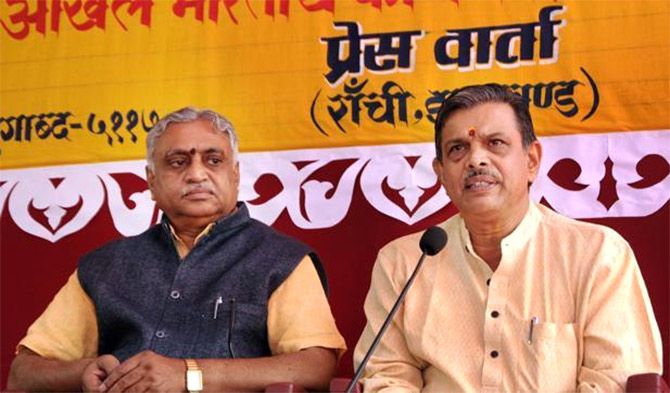Dattatreya Hosabale and Manmohan Vaidya have been invited as speakers at the literary event starting tomorrow.
Radhika Ramaseshan reports.

When Dattatreya Hosabale and Manmohan Vaidya were asked to speak at the Zee Jaipur Literature Festival, beginning Wednesday, January 18, the invites sparked a buzz in literary and political circles.
The idea of Rashtriya Swayamsevak Sangh seniors occupying the dais at an event largely seen as one dominated by Left-liberal opinion-moulders seemed anathema to many.
Hosabale is effectively the third in command in the RSS hierarchy and Vaidya is the chief spokesperson.
Namita Gokhale, a director of the Jaipur fest, could not comprehend what the uproar was about.
"We have always invited people from different ideological viewpoints. There is need to understand every perspective and point of view as part of the ongoing exercise of making sense of our times," explained Gokhale, a writer and publisher.
J Nandakumar, the RSS' joint publicity chief, said the fest organisers approached him, asking if the "top brass" could be part of it.
Gokhale confirmed the proposal came from the organisers who have programmed two equivalent sessions -- one titled 'The Legacy of the Left' and the other 'Saffron and the Sangh' -- to present in her words, "these two points of view which between them represent a spectrum of perspectives."
Nandakumar said why the RSS went ahead. "Every second lit fest discusses the RSS by bashing it. Those who speak have no knowledge of the Sangh, but they start and end their speeches by bashing us. It's time these people give proper space to the Sangh," he said.
Prafulla Ketkar, editor of the RSS' English weekly, Organiser, was less rosy-eyed than the others about urban lit fests, calling these "islands of intellectual activity." He, however, welcomed the hand extended by the Jaipur grandees towards the Nagpur pracharaks.
"At least they acknowledged that our people should be heard. Ultimately, the Jaipur fest is not a pro-RSS or a pro-Left forum. The basic purpose of literature is to evolve a complex and dialectical relationship with society and, therefore, if you want to accommodate all the changes within society, you should understand all points of view," Ketkar stressed.
Anirban Ganguly, director of the BJP-affiliated Syama Prasad Mookerjee Research Foundation, had a political reason for why the BJP and RSS' representatives might become the flavour of fests in time to come.
Ganguly, who co-authored The Modi Doctrine: New Paradigms in India's Foreign Policy, ascribed the trend to popular curiosity and interest in the saffron fraternity.
"The BJP is an entrenched pole in the Indian polity. People want to know what the BJP is about, whether its relationship with the RSS is symbiotic or not. In the last two-and-a-half years, (Narendra) Modi and the others have vigorously articulated a certain narrative that has forced people to take cognisance of the Sangh," said Ganguly.
"The RSS feels the need to have a greater outreach to tell various communities its own story."
He believed lit fests were a useful forum for the RSS-BJP to leverage its growing clout to disseminate an "alternate intellectual narrative."
"While winning elections and forming governments are important, at the end of the day, this is a battle of ideas. One side frames it as a battle for the Idea of India, we say, it's a battle for Ideas of India, for multiple ideas," said Ganguly.
However, in the "battle" that Ganguly framed, it's not as though the Sangh always itched for ideological combat.
Sources claimed at Jaipur, Hosabale and Vaidya would endeavour to project a "modern" portrait of the Parivar, and try and disabuse the stereotype of an outmoded organisation, out of synch with modern concepts of gender and social justice.
A BJP source said the Sangh took a cue from Hosabale who, at a media conclave last year, rejected the idea of treating the lesbian, gay, bisexual, and transgender (LGBT) community as criminal and emphasised that but for physiological differences, men and women were on a par.
"He is going to take the exercise forward at Jaipur," the source said, "so that the audience picturises the Sangh differently."
Bolstered by the influence of lit fests as "thought vehicles", Nandakumar even hosted his own in Kochi last December, unfazed by the Left Front government's antagonism towards the Sangh and BJP.
"Kerala lacks intellectual discourse, so I thought why not conduct something that brings different languages and ideologies under one umbrella?" he said, adding that the "success" of the annual book festivals he has held since 1997 at Kochi, despite the political hostility, spurred him to hold a lit fest.
Has the Kerala experience hit home the importance of state patronage to see through jamborees like lit fests?
A BJP source conceded it had.
"The Sangh thinks having a full majority BJP government at the Centre is a good opportunity to use all platforms and propagate its ideas. This is thanks to the leadership of the present RSS head (Mohan) Bhagwatji."
"The Sangh has no issue feeling it is part of the larger ruling dispensation. The BJP has no inhibition in saying we are part of the same nationalist family. That's the difference between the Vajpayee and Modi regimes," he said.
IMAGE: RSS leaders Dattatreya Hosabale, right, and Manmohan Vaidya at a press conference.












 © 2025
© 2025